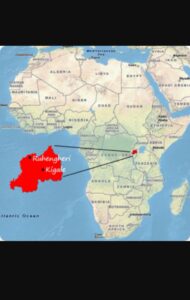
Some years ago, I spent several hours at the Jomo Kenyatta International Airport in Nairobi on my way home from a business trip to India. As I sat in the waiting lounge, I saw droves of neatly dressed men and women, bankers for the most part, capitalist to their finger tips, draped in dark, grey suits, parading in and out of the airport.
As they waited for their flights, I could pick up much of their conversation without really giving the impression that I was listening. I like to eavesdrop at airports, especially when I have many hours to kill and boredom is hitting me on the chin.
Nearly all those men and women, armed with dollar-fattened briefcases, seemed to have their eyes set on one destination. Yes, you guess right: Kigali, Rwanda. They all seemed to be talking about Kigali, Kigali, and nothing but Kigali. In fact, one of them was on the phone for nearly an hour with a business partner, who must have been waiting for him in Kigali. As he waited to board his plane, he was busy ironing out a few IT-related issues.
For the most part, those briefcase-toting capitalists only talked the language of information technology (IT) and I could gather that Rwanda was being wired up for the smooth flow of modern information technology at an impressive rate. As I watched those dollar-bloated capitalists parading in and out of the airport, my mind went to an edition of the BBC magazine, Focus on Africa, which I read not that long ago. In it, the journalist talked about how Rwanda was being hooked up to the internet. Apparently, all ministers and parliamentarians had laptops with internet connection, and it was not rare for cabinet and parliamentary meetings to be held online. Mind you, this was before Covid-19 made online meetings universal.
The difference between Cameroon and Rwanda in this domain became quite clear to me that day at the Jomo Kenyatta International Airport. While every corner of Rwanda was being hooked to the internet, the Cameroon government was shutting down internet connection to the English-speaking parts of the country on the pretext that it was being used to fuel rebellion against it. In fact, a promising start-up in Buea, dubbed “Silicon Mountain,” was practically ruined because of the frequent internet interruption to that part of the country and many of the young, enthusiastic entrepreneurs have all dispersed, many finding a foothold in Silicon Valley in California.
Several years ago, we tried to set up a V-sat for internet connection to our school in Douala. No sooner had the satellite dish gone up than one potbellied, unshaven fellow was standing at our door the next morning asking for taxes. That’s all one hears about in Cameroon: impôt libératoire’, impôt sur la société, impôt sur la toilette’, impôt sur la cuisine, etc, etc.’ Good Lord! While the Biya administration is imposing taxes on everything, including information technology equipment in Cameroon, Rwanda waives such taxes altogether. There is therefore no doubt that it has taken such a firm lead in IT technology in Africa. Bravo, President Paul Kagame!


